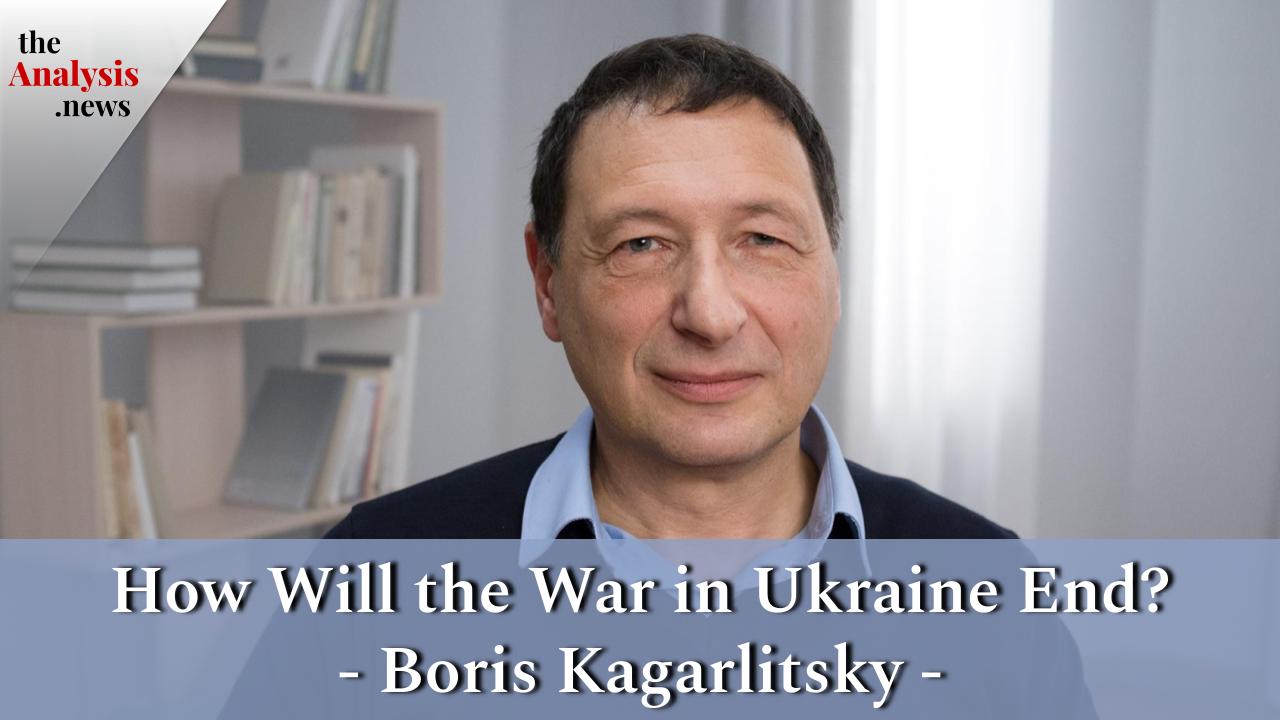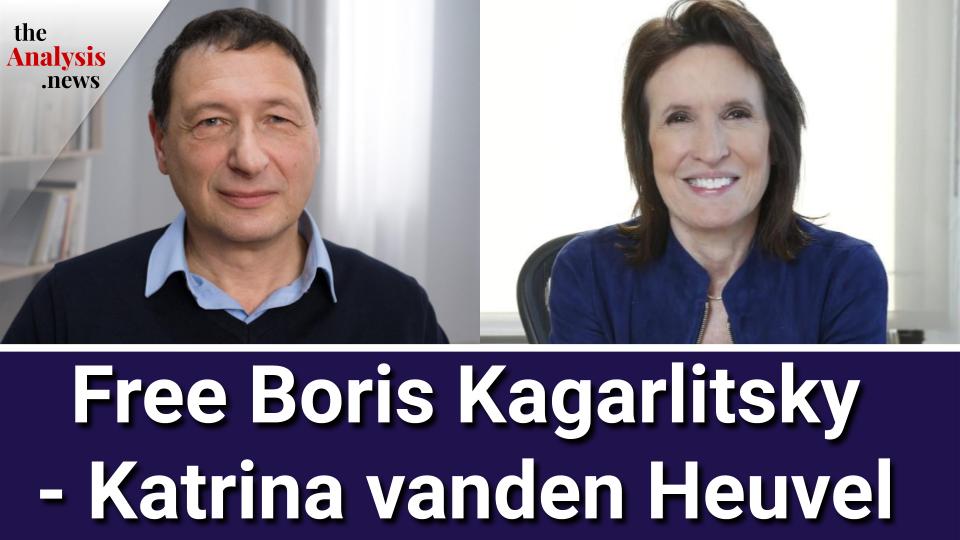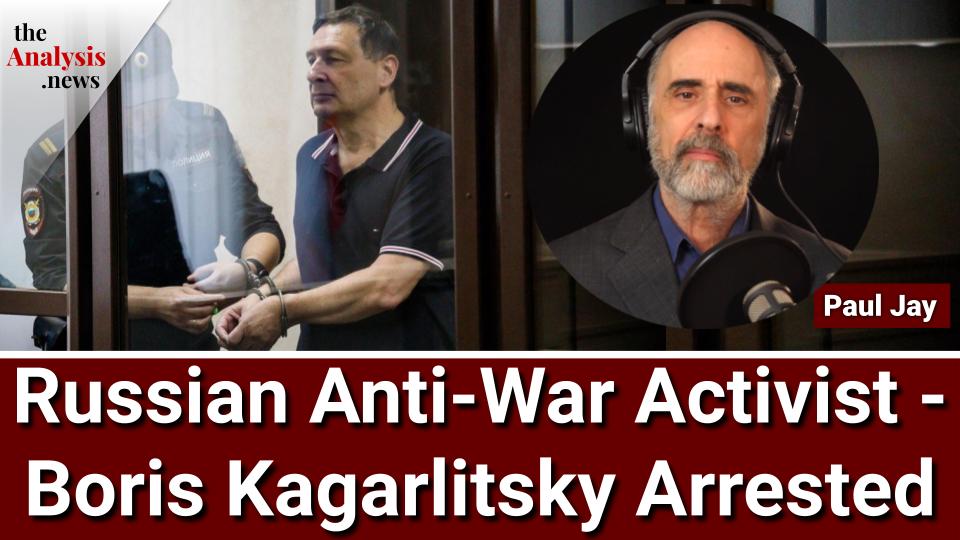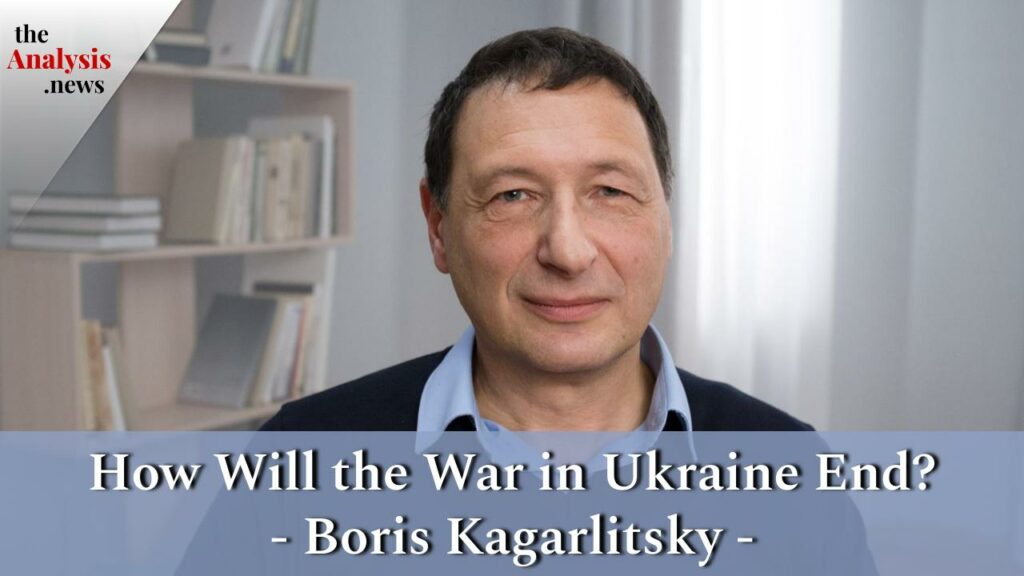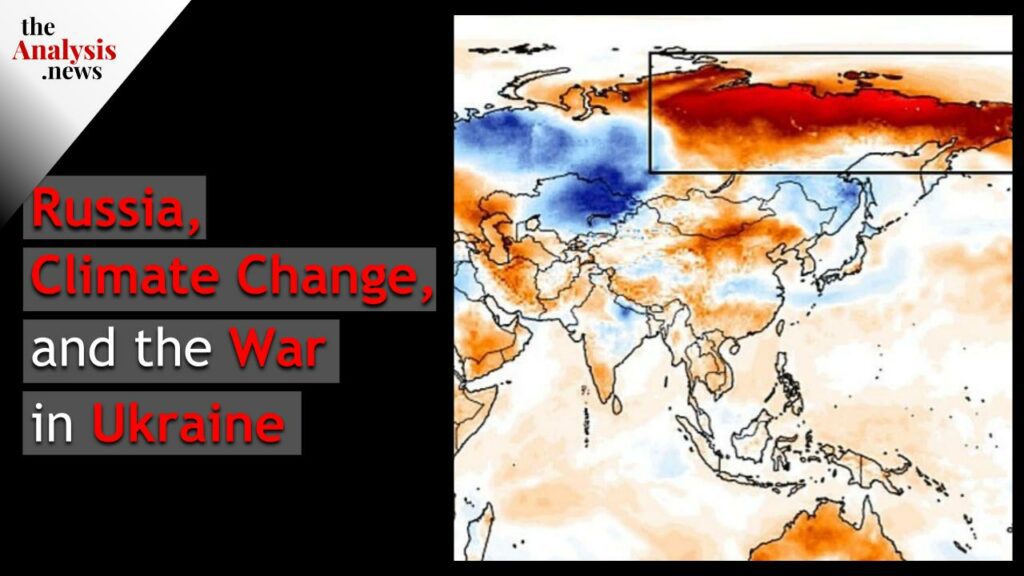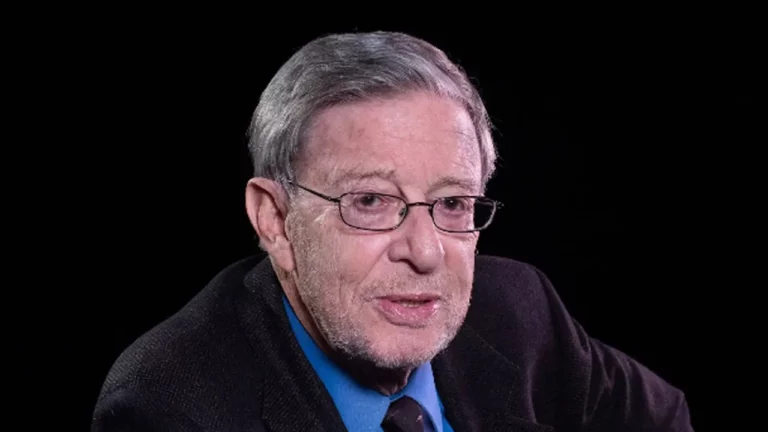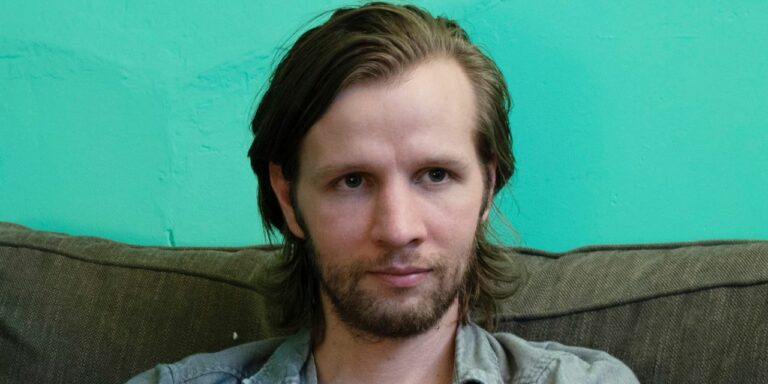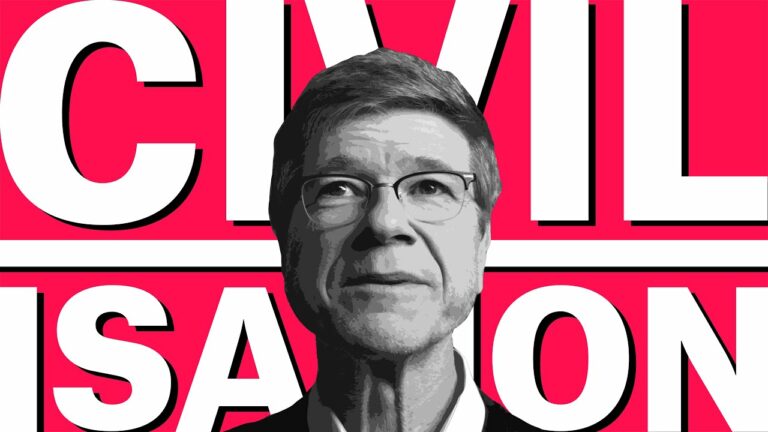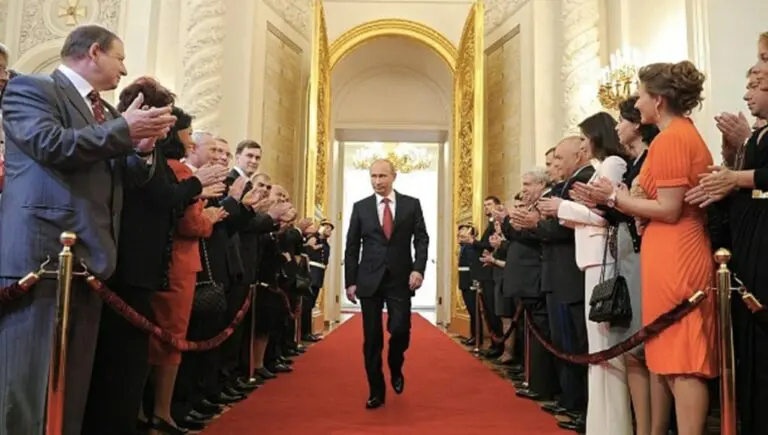This interview was originally published on February 23, 2023. Boris Kagarlitsky talks about the mood of the Russian people and the possibility that the Russian military leadership might insist on ending the war.
To view more interviews with Boris Kagarlitsky, please click here.
Paul Jay
Hi, I’m Paul Jay. Welcome to theAnalysis.news. In a few seconds, I’ll be back with Boris Kagarlitsky. We’re going to discuss the mood of the Russian people and just how might this war in Ukraine end. Please don’t forget there’s a donate button at the top of the web page. We can’t do this without you. On YouTube, please subscribe and then come over to the website. Everybody, please, if you’re not already, sign up on our email list, and be back in just a few seconds.
Hundreds of thousands of people have been killed in the Ukraine war, an illegal Russian war of aggression against Ukraine. I’ve said it before, and I’ll say it again, there was no imminent threat against Russia from Ukraine, which would have been the only justification for war. No doubt, NATO and the U.S. played a provocative role, and no doubt NATO should be disbanded. The U.S. and NATO continue to escalate and avoid compromise, but that does not change who is the aggressor in this war. The dead includes tens of thousands of Russian workers recruited mostly from outside the big cities. How will this monstrous war end?
Now joining us is Boris Kagarlitsky. He’s a well-known international commentator on Russian politics. Boris was a deputy to the Moscow City Soviet between 1990 and ’93. During that time, he was a member of the executive of the Socialist Party of Russia, co-founder of the Party of Labor, and adviser to the chairperson of the Federation of Independent Trade Unions of Russia. Previously, he was a student of art criticism and was imprisoned for two years for anti-Soviet activities. Boris’s books include Empire of the Periphery Russia and the World System, Russia Under Yeltsin and Putin: Neoliberal Autocracy and New Realism, New Barbarism: The Crisis of Capitalism.
In 2021, Boris was sentenced to 10 days in jail for sharing content on social media promoting unpermitted protests against the results of Russia’s recent parliamentary elections. In fact, if I have it right, Boris has the distinction of being put in jail by every Russian government since and including [Mikhail] Gorbachev. Thanks for joining me again, Boris.
Boris Kagarlitsky
Thank you. I’m very happy to be with you, Paul.
Paul Jay
Let’s start with what is the mood of the Russian people. We’re reading in the Western press that maybe 200,000 Russian soldiers have died. I don’t know if that number is realistic, but they’re saying it could be another 200,000; that’s if the Western press is to be believed. Of course, hundreds of thousands of Ukrainians have died, both women, children, volunteer soldiers, and professional soldiers. What’s the mood of the Russian people? Have they had enough of this?
Boris Kagarlitsky
I think the mood of the people is very confused. Of course, we have to understand that there are different people, there are different views, and there are different situations. Speaking about the number of casualties, I think maybe 200,000 is a bit too much. It is definitely above 100,000 and maybe 150,000. So we cannot count because the official bodies, the official institutions, never give us any data. They stopped announcing the number of casualties for months now. At the same time, if you go to some provincial town, you see the cemeteries, and you see that there are whole new sections at the cemeteries which are dedicated to the victims of this war. They’re expanding cemeteries. It’s a tragic fact that physically, they’re doing a lot of work to massively expand cemeteries to provide room for more bodies to be buried there. So it seems there is also a feeling that there should be more casualties soon.
Paul Jay
In the 1960s and the early ’70s, the Americans, I think, lost somewhere around 60,000 soldiers in Vietnam, and a very significant antiwar movement developed. Is there something like that developing in Russia?
Boris Kagarlitsky
Not exactly, and for one reason. There is an antiwar movement, and it is strong enough, but there are two differences that we have to consider. One is that Russia today is a very authoritarian state. I mean, it’s much worse compared to what it used to be, even two years ago. So in that sense, there is a lot of repression. There are quite a few people who are jailed, and there is a tremendous effort on the side of the authorities to suppress any opposition media and any opposition opinion. If you protest actively, then you end up in jail immediately. There is no legal space for protest. Quite a few people left the country. So we see a massive exodus of people who were trying to avoid the draft. We have different data. Nobody calculated the numbers, but about one million people left the country to avoid the draft. As you know, the government managed to draft about– there are different estimates because they don’t tell the real data, the real information. Anyhow, their estimate is that they managed to draft about 250,000 people for the army, and about one million at least fled and left the country. So five times more than they managed to force into the army.
Well, this is one side of the story, but there is the other side of the story which is also very important. Who are those people who are drafted into the army? Here we come to the big social problem, partly understandable for the Americans, I think. In the United States, after the war in Vietnam, they changed the policy and introduced what sociologists sometimes call the poverty draft, which means that they were trying to get into the army people from depressed social layers, depressed areas, and so on. So for those groups, getting into the army is sometimes a good opportunity to earn money for their families. This is exactly what is happening in Russia now. Once they try to press people in Moscow, St. Petersburg, Nizhny Novgorod, Irkutsk, or Novosibirsk, these kinds of modern urban centers, then there is a lot of resistance. People just disappear. They just leave the country. They leave their flats, and they run away.
There were cases of violent resistance, including one case of a military representative who was in charge of drafting people. He was simply killed in Irkutsk by one of the people who he tried to draft into the army. By the way, this guy who killed the officer is in jail, of course, because he did it openly. He just came to the office and shot the officer, and now he’s in jail. They are afraid to put him on trial because the guy is so popular. If they put him on trial, there’ll be hundreds of people who will come to the courtroom or to the court building to support the guy. So he is in jail, but there is no trial.
This is what is happening in big urban centers. Then if you go to small villages, to depressed towns, also to some depressed regions of the country, you will discover a completely different picture there. Quite a few people say, “Okay, at least they’re paying.” So once you get drafted, it’s good news because the family is going to get money. People were unemployed, or they had shitty jobs which didn’t pay at all. The families were in very bad shape. All of a sudden, when your son or your husband gets drafted, the family gets money.
Economists even announced that in these areas, the economic situation and the average income increased visibly. There were also cases where people were interviewed by sociologists. The sociologists, of course, asked quite a reasonable question. “What about you getting killed?” The most typical answer was, “okay, but that’s also good news because my family will get money for that. I’m going to die for my family. I will be ready to die for my family.” Nobody said, almost no one says, “I’m going to die for Putin, or I’m going to die for Russia.” They keep saying, “if I’m going to die, if necessary, I’m going to die for my family.” The family will get the money, and that will be a real support for the household.
At the same time, there were a lot of protests among the draftees and also among the families. It is shocking that quite a lot of protests among the families are about the cases when families don’t get the money for the killed men. They were expecting to get a lot of money. It’s really a lot of money according to Russian standards. It’s up to 6 million rubles for a soldier who died. It’s a lot of money, really a lot of money.
Paul Jay
How much is that in dollars?
Boris Kagarlitsky
It’s about $80,000, approximately. It’s a lot of money. It’s really a lot of money. For poor Russian families, it’s a real lot of money. Well, quite a lot of families don’t get this money, of course, because they’re trying to invent all sorts of ways to avoid paying, like saying, “your son or husband is missing in action rather than got killed. So we have no information he is missing in action.” That means that we can keep it forever. We still don’t have the information for everyone who was killed in the Second World War. We don’t have all the names. So they either say your son was not killed or he is–
Paul Jay
How long can this go on?
Boris Kagarlitsky
I don’t know, but I think– well, the main problem is not with those people who suffer directly from the war. That’s the big problem. As I told you, there is enormous discontent, but this discontent is located in the big cities with modernized and urbanized populations. Of course, these cities are essential. They’re important because the majority of Russians are now living in these big centers. At the same time, we still have quite a lot of people who are living in these depressed small towns and areas. It’s about one-third of the population of the country, approximately. They face the worst consequences of the war. At the same time, there are less protests, less discontent, and so on. So this is exactly the problem. The most protesting, dissatisfaction, and angriest areas are those areas that suffer the least from what’s going on.
My feeling is that the popular discontent is not going to be the major problem. The major problem is elsewhere. The major problem is with the bureaucracy and, ironically, with the military themselves. There are plenty of signals coming from the military, also from the security operators, and from the bureaucracy that these are the groups that are the angriest, which are the most unhappy with what’s going on, and which are really interested in stopping because the army is suffering enormous casualties, but it’s also losing prestige. It’s losing country [to be losing popular support or political control over the state]. It’s facing enormous blows which are destroying the structure of the army. This war reveals the real weakness of the Russian military, which makes the military extremely unhappy. They really are interested in stopping it. They’re really saying, “enough is enough. We have to stop. We have to do something to reorganize the military operators because the war revealed that the Russian army is only a pale shadow of what it used to be historically. We have to do something about it before doing anything else, before starting any new war.” They’re not very happy with fighting Ukrainians anyhow because many of them personally know their adversaries. Many of them used to serve in the very same Soviet army, or at least they used to study at the same military academies. They are totally unhappy with this war. The military is the main opposition. It is very clear that Putin is now pushing the military to go into a new offensive. There are rumors, which I think are correct, that the generals are doing everything to prevent it from happening because they know it’s not going to produce any results. Secondly, they don’t want to do it anyhow.
Paul Jay
The arms manufacturers are loving this. The Americans and NATO have been saying they’ll stand on the principle of Ukrainian sovereignty until the last Ukrainians dead. This could go on for a hell of a long time. It’s a stalemate where people on both sides keep getting killed.
Boris Kagarlitsky
Not exactly. I don’t think it’s going to be a long stalemate. There is a stalemate right now, but it’s not going to continue forever. First of all, yes, Ukraine is suffering a lot. Don’t forget they’re getting a lot of civilian casualties, which is not the case in Russia; that makes the situation very different. When their citizens are bombed, almost daily there are attacks on civilian targets in Ukraine. Partly, by the way, it’s not because it’s a conscious decision of the Russian military, but because it’s a war. There’s always this famous collateral damage. Remember, this is another famous American formula. It’s not always that the Russian military wants to hit civilian targets. There is a lot of collateral damage.
But anyhow, civilians are getting killed almost daily in Ukraine, which makes the situation very different. The Ukrainians are forced to fight back. I don’t think it’s going to continue forever because, as I told you, the Russian military is unhappy. The security services are not very happy with this either. Local administrative operators and the bureaucracy are very unhappy. Also, the businesses are not happy with what’s going on because the economic situation is deteriorating very fast.
There is a growing lobby with the elite within the state against the war. The main problem is not that the Russian state is going to fight forever. The main problem is elsewhere. The main problem is that Putin himself and his closest entourage cannot find their way out. They cannot find a solution that is not going to damage their prestige and their political positions. That is the main problem. I think they’re getting exactly what they deserve. There are rumors that the elite, the broad elite, not the narrow elite around Putin himself, but the broad elite which used to run the country and which is now getting less and less influential because Putin is concentrating power in his hands. So this broad elite is not only unhappy, but they are discussing how to get rid of Putin somehow. I think if things continue the way they are going, they will do it. They will find the way.
Also, partly because Putin is ill, he’s deadly ill. Of course, modern doctors and modern health care are really doing miracles. I think any other normal Russian citizen with the same diagnosis would have been dead already for years. Anyhow, there are different rumors that Putin could be declared so ill that he cannot carry out his duties as a President or something like that. They’re discussing these things. There are very strong rumors.
There is a joke, a practical joke, which is happening right now. In 1991, when there was an attempted coup d’etat, the famous GKChP, State Emergency Committee, tried to replace Gorbachev. They started showing the ballet Swan Lake on Russian television. On every channel, Swan Lake was shown on every channel of Russian television. The reputation of this great [Ilyich] Tchaikovsky’s ballet now in Russia is very specific. Every time you’re going to say something about a possible coup d’etat, you use the metaphor that we want to watch Swan Lake. It’s time for Swan Lake to be shown; that’s the metaphor that is typical for the Russian public. Now, what do you discover? These days all over Moscow, there is an announcement that is true. I mean, it’s not a joke; it’s true. There is an announcement all over Moscow that on February 24th, there’ll be a big show in the Kremlin. They’re going to show Swan Lake in the Kremlin.
Paul Jay
With the anniversary of the invasion–
Boris Kagarlitsky
They’re really doing it. You see these posters all over the city, and everybody laughs and says, “maybe it’s just an announcement. Maybe they’re just telling us something. Maybe it’s just a coincidence, but a very funny one.” It shows you the mood, you see.
Paul Jay
Now, some people have said if there is a coup against Putin, it may not be someone who wants to end the war who comes to power. It could be forces who want to fight the war even more aggressively.
Boris Kagarlitsky
It’s true that these forces exist. These forces are usually associated with the name Yevgeny Prigozhin, who is the head of the private military company Wagner. We have to understand that, first of all, their real military capacity is very limited. Yes, they have about 40,000 people, but most of them are concentrated in Ukraine at this point, and quite a few got killed. There is an open conflict between them and the military. The military is trying to undermine them by not supplying them with equipment, ammunition, etc. Actually, it’s almost like a war between the military and Wagner. They’re trying to make Wagner Group pay the highest price possible for what’s going on. If there is a clash between the military and the groups like Wagner, the military will definitely have the upper hand. They’re much stronger, better organized, and much more motivated. These so-called ultra-patriots are very confused and demotivated. There are lots of quarrels among them. Yes, some of them are very unhappy, but even among these people, there is a growing mood that, at least at this stage, the war should be stopped. Maybe something has to be done. Maybe we have to start a new war soon, but not at this stage.
Paul Jay
For progressive people outside Russia, outside of Ukraine, Americans, Canadians, Europeans, and people from the South, what should they be demanding of their governments? Should they be demanding a push towards some compromise, a way out for Putin and Russia? Of course, part of that argument is the more desperate Putin gets– that’s assuming he’s getting desperate– there may even be the possibility that he might actually use some tactical nuclear weapon.
I saw one Chinese editorial for Global Times that actually said if Putin fears for his own life, desperate measures could get very desperate. They didn’t use the word nuclear weapons, but that was clearly what they were hinting at and were concerned about.
Boris Kagarlitsky
Well, I don’t agree with that because I think, again, the military will not allow those so-called desperate measures. You see, you cannot use specific weapons without the agreement of those people who technically use these weapons. It is very clear that the generals, at least some of the generals, are quite dedicated to stopping the war. If the war is going to be stopped, it will be stopped on our side, and it will be the Russian military and security operators who will stop the war. How and when they will do it is a different story because it’s very difficult. You can imagine, given the state we have. Also, given the fact that these people are really patriotic, they’re not going to undermine the real security status of the country. But they’re quite dedicated, at least, to sample some way out to be discovered. The solution will be found on this side, on our side.
Speaking about the West, the problem is that all compromises which are acceptable for Putin are compromises that are unjust in their very nature. In a sense, they have to give Putin the way to present this war as a victory, at least to some extent, and to consolidate the regime, which will be the worst thing for Russia possible. If this regime gets reconsolidated again after what happened, it’s going to be the most tragic outcome for Russia, which you can only imagine. So in that sense, the defeat of Putin is definitely a better outcome for Russian society and for the Russian people than his victory. It doesn’t mean that we have to support the Ukrainian government or the West. We know pretty well that the Ukrainian government is almost as oligarchic as the Russian government. It is definitely a government that is responsible for quite a few injustices and quite a few things which we should never support. In that sense, it’s not a war where we can say that these are the angels fighting the devils or something like that. We have to remember that this time it was the Russian government that started the war, launched the attack, and occupied our neighbor’s territory. This is very important.
I just have to remind you that in 2014, I was critical of the Ukrainian policy of military intervention in Donbas. I think it was not only wrong; it was a criminal policy because they started the war. They were responsible for the impressive number of casualties on both sides. There were ways to solve the problem easily by peaceful means, or at least there were ways to develop this conflict without killing people. In 2014, I was absolutely negative about what the Ukrainian government was doing, even though I had no illusions about what the Russian government was doing on this side. This time, it’s the other way around; for me, it’s the other way around. I know pretty well that the Ukrainian government does not deserve much of my sympathy, but this time it is Putin and his entourage who started the war and are responsible. In some way or another, they have to be punished. Of course, I think they have to be punished by the Russian people in Russian society and, hopefully, by the Russian military. One way or another, I think it’s going to happen.
In that sense, what the Western Left should do, what progressives should do in the United States, Canada, and Western Europe, first of all, they have to support the peace movement in Russia, first and foremost. The peace movement exists. By the way, there is still a serious development of some underground media, informal media. The official media has completely closed down. I mean, the opposition media is closed down. Still, we have a very strong presence online, on YouTube, up to the point that now Putin’s deputies in the Duma are discussing closing down YouTube and probably closing down the Internet, which would be technically and economically a disaster. So far, they have failed to do that. There is a movement. There is a very strong tendency and a very strong presence of people who are against the war. Of course, quite a lot of people left the country, but there are plenty of people who are inside the country who are not afraid to speak out. Rabkor, our YouTube channel, speaks out against the war almost daily. We’re still here, and we will continue. We have problems, as I told you before. We have quite a few problems, but we continue to operate, and we will continue to operate.
Paul Jay
One of the slogans that are being given amongst some of the antiwar movements in the U.S. is Russia out of Ukraine and put an end to NATO. What do you think of that?
Boris Kagarlitsky
Well, I agree. I agree. I should say more. I think it’s not only that Ukraine shouldn’t join NATO; I think NATO and all military blocs should be dissolved for good. That should be our end goal, at least. It’s not that there should be some military bloc around Russia or China against another bloc around the United States of America. We have to fight to dissolve all the military blocs of that kind. By the way, that can be the long-term outcome of these confrontations now. Even if Russia gets defeated and leaves Ukraine, the question has to be solved in the sense that you have to have some peace and security conference for Europe or Eurasia. There should be some long-term solution, maybe like the new Viennese Congress, which, as you remember, was in Europe after the Napoleonic wars. There should be some long-term decisions about guaranteeing peace and security for everyone. It’s not going to be achieved just through the victory for one side. Even if one side wins, there should be some long-term negotiated settlement for the world and for Europe.
There is one more point I want to stress. Speaking about Western progressives and the Western Left, there is one very dangerous tendency in Ukraine, in the West, and among Russian liberal or right-wing immigration, who blame all Russians for what’s happening. They’re going to try to present the Russian society and people as being responsible for the war, crimes committed, Putin, and so on, which is totally unjust. We know that there is a lot of resistance. We know that the main victims of what’s going on are Russians at this point. It’s absolutely absurd to pretend that Russian culture is to be blamed for what’s going on and that the Russian language is to be banned, and so on. It’s absolutely disgusting, I think. We have to resist that. We have to fight back.
First, this whole idea of collective responsibility is unjust to those who resisted these policies. But it’s also a way to save those who are responsible. You see, there are always individuals and social groups which are concretely responsible for what is happening. Instead of saying that every Russian is to be blamed, every Russian is to be somehow punished for what’s happening, you should say, “no, it’s not about every Russian. It’s about particular concrete individuals and groups which have to be punished at some point.”
Paul Jay
The last time I interviewed you, there was an advisor to Zelenskyy, who you were somewhat positive about. He’d been speaking on Ukrainian television in the Russian language. He was criticizing this attempt to vilify all Russians. But if I understand it correctly, he’s now resigned and has been publicly critiquing Zelenskyy and the government for pursuing this Russophobia. What do you make of that?
Boris Kagarlitsky
Exactly. This is Oleksiy Arestovych. By the way, some people see him as a potential President of Ukraine in the future. He has a very special personality because sometimes he says a few things which I will never agree with, and a few scandalous things also. He’s a character, so to speak. In that sense, we should not just agree with everything he says. But the point is that he has a very strong position on the Russian language, on Ukrainian ethnic Russians, and on Russia itself. He keeps saying that the Russian language should stay as the second official language or at least the second language in Ukraine. So the Russian language should be defended. Russian speakers should have the right to speak their mother tongue. Russian culture is essential for Ukraine itself, which is exactly right. Kyiv was one of the historic centers of Russian culture. As you know, a few Russian writers and poets were born in Ukraine and Kyiv. In that sense, Ukrainians have all the reasons to appropriate Russian culture as their own. Instead of rejecting it, they have all the reasons to say, “this is our culture as well. This is our language as well. We have the same rights and the same claims for this language as Russia has. This language is no more Russian for the Russian state than it is for Ukrainian society.”
This is a very strong position of Arestovych. He keeps insisting on that, and he gets attacked. He keeps saying that there are positive tendencies in Russian society that should be encouraged. So on these issues, he has a very progressive position. But of course, sometimes I suspect that he is a Ukrainian imperialist. Sometimes when I listen to him, I have a suspicion that he wants some Ukrainian Empire to be built on the ruins of the Russian Empire. This approach is sometimes visible in his speeches. Sometimes he presents Ukraine as a potential hegemon for the whole of Eastern Europe. Great Ukrainian Empire to be built on the ruins of the Russian Empire. That’s not the approach I would be very happy with.
Paul Jay
Last time we talked, I think it bears discussing again because what I’m about to say hasn’t gone away. There are people on the American Left, European, and certainly the global South that primarily blames NATO for the war. China more or less takes that position. It’s essentially that Putin was provoked into the invasion, the 2014 coup, and the talk about Ukraine joining NATO, although I think that was highly exaggerated. But still, there’s a lot of conversation about it. The argument gets repeated. The idea is that the primary villain of this piece is the Americans, and Putin was responding to that. What do you make of that argument?
Boris Kagarlitsky
Well, I understand why this opinion is emerging because Americans did a lot of terrible things to all sorts of places. If you live in Asia, Latin America, or Africa, you rarely face any problems with Russians. You face a lot of problems with American imperialism. American imperialism, in this case, will be your primary problem, much more than Russian imperialism. Russian imperialism, or whatever you call it, is a problem for the former Soviet Union countries, for the countries which were part of the Soviet Union. For Russian society itself, it’s a major problem; let’s be clear.
The main problem with Putin is for Russians, for Russian society, and so on. So in that sense, of course, that approach is understandable, but unfortunately, it’s not correct. It’s not correct in the sense that one of the great problems with Putin’s war is that it is objectively strengthening American imperialism. It is objectively working against the traditional goals of peace movements. Objectively, Putin gives reasons and arguments to those who want to strengthen NATO, who want to expand NATO, who want to expand military industries, and so on; that’s exactly how it works. Putin’s responsibility is to Russians. Russian oligarchy’s responsible for destroying much of the ideological and moral grounds on which global peace movements and many progressive movements in Europe, at least, existed for years. If they did not destroy it, they undermined these moral grounds. Of course, now it’s not easy, and I think in many ways it’s not possible to say, for example, we should not supply weapons to Ukraine because we are for peace because we know that the other side is not going to stop fighting. Stopping the supply of weapons to Ukraine means just stopping the supply of weapons to one side. The other side will continue fighting and bombing. This is not possible.
On the other hand, if you’re saying the opposite thing like supply more weapons and develop military industries, you’re also doing the wrong thing because you’re playing into the hands of those people who are reactionaries, who are historically responsible for quite a few crimes against people all over the world. In that case, most people, many of my friends, prefer to keep silent because they cannot say either thing or make either of these two statements, which is very understandable. So who is responsible for that disaster? I think Putin, and not just individually Putin, the Russian oligarch, and these people in the Russian elite who launched this war are responsible.
They are creating tremendous problems inside Ukrainian society because they’re playing in the hands of those who want to get rid of the Russian language and Russian culture, who want to suppress the Russian minority, and so on. They’re playing into the hands of the most reactionary forces in Ukrainian society. I hope they will be punished for that by history. I’m quite optimistic because I think that Russian society is not dead. I’m sure that there are forces that are very much beneath the surface, they’re very much invisible, but they are in existence. They exist. They’re real, which will show themselves and make us overcome that situation. We have to change the situation inside Russia. It is possible. It will be possible. I’m pretty sure that once the situation changes here, once the war has stopped from this end, then we’ll see a completely different picture because we have to start not only peace negotiations but we have to start real work for a long-term peace settlement, not just with Ukraine, but for Europe.
Paul Jay
In one of our earlier interviews, we talked about the climate crisis and how destructive it has already been in parts of Russia, especially in Siberia. A report came out recently from James Hansen, who’s been one of the early leaders warning people about the climate crisis. He’s now saying that we’re on our way to 10 degrees warming. Never mind two, three, or four. We’re on our way to a world that is completely unliveable. The invasion of Ukraine, whatever you make of the reasons why it started, although I have no doubt, again, the primary responsibilities on Putin, that said, there’s no conversation going on at a global level of any significance about what to do about the climate crisis. To add to that, we’re already into a period where there are virtually no nuclear arms reduction treaties of any kind. The one that’s left is not functioning because there are no inspections taking place. Is any of this being talked about or debated in Russian media amongst the people? Is it in the consciousness of the people just how dangerous the world is getting? There’s more of an existential threat than what’s happening in Ukraine, assuming it doesn’t go nuclear.
Boris Kagarlitsky
Honestly, I think people are much more worried about the war than climate change for obvious reasons. The war is taking place around us right now, and climate change keeps being seen as something which is postponed. It can and maybe will happen later. By the way, I should say that before the eruption of the war, there were some interesting debates in Russian media about climate change. The debates were, in many ways, very positive. I think, in many ways, even more positive than in Western countries. First of all, the biggest question was what can be done positively, not in terms of just, for example, limiting the production of what can be done positively.
For example, there was a big debate about planting forests, a mass planting of forests in Russia. By the way, in Ukraine also, there were discussions in Ukraine about the reforestation of the country. There was a plan to plant a few million, probably billions of trees in Ukraine and Russia; that was discussed very seriously among the experts. It was a very good idea because these are green jobs. Green jobs, in the most direct sense of the word, are planting forests. Russia faces deforestation, and we have to do something about it. It also became a big problem for us because it leads to a crisis with water because rivers are getting shallow, and that is creating quite a few problems. So there is an approach.
Also, there was a very interesting discussion in the media about who’s going to pay the price for the New Green Deal if we go forward with it. In that sense, it’s very interesting to quote an article, a brilliant article by a friend of mine, Nikolay Protsenko, who published it just a few, I think, weeks before the war, saying that yes to the Green New Deal, but we have to put forward the question, who is going to pay? There is a corporate agenda about ordinary people and working people being forced to pay the price for environmental reforms. The case with the Yellow Vests in France is very typical in that sense that they were trying to make ordinary poor people pay while corporations were going to make profits out of it.
The argument made by Protsenko was very clear. We shouldn’t allow a Green New Deal to become a corporate agenda because the elites can make profits out of everything. They made profits out of destroying the planet. They can make profits out of saving the planet. It’s always about profits. Of course, maybe it’s better if they work on saving the planet, but again, the question is, who is going to pay? It’s a social and it’s a class question that should be put forward. I really enjoyed this article. I think it’s very essential the way he framed the question.
Paul Jay
The other issue is just what I mentioned. We’re basically in an era or a period where there are no nuclear arms reduction treaties of any kind. There’s a massive investment taking place in the U.S., and I know there certainly was a massive expansion planned in Russia. I don’t know if they still have the money to do it, but both countries were planning to spend more than a trillion dollars on modernizing their nuclear weapons. I assume Russia is still going ahead with it. China is now much more expansive in its ICBM program, which had been quite modest for decades. We’re entering a period that Daniel Ellsberg and others think is actually more dangerous than the Cuban Missile Crisis. Is there any chance of getting some rationality into this situation, some treaty negotiations in spite of what’s going on in Ukraine?
Boris Kagarlitsky
It depends on what government we are going to have two or three years from now. If we get some new government, which would not necessarily be more progressive, maybe it will be more progressive, but at least it will be more reasonable, then I think they will be interested in limiting a nuclear arms race for one simple reason– we have to rebuild the economy. We don’t have much money. We can solve the problem, by the way. It shouldn’t be said that there is no way we can’t get the resources to modernize and rebuild the economy. We will get these resources even if Russia has to pay the reparations to Ukraine because, by the way, this is another irony of the situation. Some pro-Kremlin people say that we should not sign a peace treaty because a peace treaty would necessarily mean that we would be forced to pay the reparations for the destroyed infrastructure, buildings, and everything that we destroyed in Ukraine. It will be a tremendous cost that the Russian economy and Russian society will have to pay.
The irony of the situation is that imagine if Russia wins the war and occupies Ukraine. Who is going to pay for rebuilding their infrastructure and buildings? Russia is going to pay, and it will be more because if we take the case when Russia leaves Ukraine, the Russian state will have to pay reparations, but the West will help. The West will at least be forced to spend some money on rebuilding Ukraine. If Russia occupies Ukraine, the West will not invest a single penny into rebuilding Ukraine. Russia is going to pay the whole cost of it. So in that sense, it’s better to pay reparations than to pay for the so-called victory for Putin, which will be more costly for the Russian economy.
Coming back to the point of nuclear weapons, I should say that, first of all, it very much depends on what kind of government we’re going to have. If we get a better government or at least a government which is partly composed of the same people, but people who will try to improve their reputation after Putin, which is quite possible. They’re going to have the same bureaucrats who are going to say, “Okay, now we’re good guys. We are not going to invade anyone anymore. We are going to be like the Weimar Republic in Germany, pretending that we are Democrats and good guys.” They will not be so interested in nuclear weapons. They will be interested in something else. They’ll be interested in rebuilding the economy. They will be interested in improving their reputation abroad.
Limiting nuclear weapons for Russia, in this case, will be a very attractive option because it allows them to save money. Instead of spending money on weapons that no one goes to use, at least hopefully no one is going to use, it’s useless equipment because every time you try to use it, you are inflicting damage on yourself. You’re inviting others to use the same weapons on yourself, which is stupid. Among other things, it’s just stupid. It used to work in the Cold War times in the sense that there were weapons that existed but were not to be used. They guaranteed peace because they guaranteed, at least from this logic of mutual destruction, they guaranteed peace among two big blocs. Now the problem is we don’t have these two big blocs, and we have a much more complicated picture.
In that sense, using nuclear weapons, on the one hand, there is a temptation to use nuclear weapons on a third party, so to speak, on somebody who, for example, does not have nuclear weapons. In the long run, it’s even more dangerous because it’s like opening Pandora’s box, which brings up all sorts of terrible consequences. I think, again, the Russian government, after Putin, quite possibly, may start talking about nuclear disarmament. It’s pretty possible on the Russian side. As long as we do other things– we have to get rid of Putin. There is no way I can influence these situations. Somebody at the very top has to solve the problem in one way or another. Then they have to reform the government and present it as a new government. The new government will be very much the same old government with a few new faces but will try to present itself as the new beginning or something like that. I’m sure the West will agree with that because they will love to have the old bad guys, the same old bad guys again, and call them the new bright democratic figures as they already did a few times with other countries.
What Russian progressives should do is try to influence the situation, and try to put pressure on these governments in order to go into more serious reforms, also in terms of peacemaking, in terms of disarmament, and so on. So I think disarmament is the solution. If you don’t want any more wars, you have to disarm. This is the obvious answer. Not to arm yourself to the teeth but to disarm.
Paul Jay
All right. Thanks very much, Boris. Thanks for joining us.
Boris Kagarlitsky
Thank you, Paul.
Paul Jay
Let’s do it again soon.
Boris Kagarlitsky
Yeah. Don’t forget to remind people about the Russian Dissent Substack.
Paul Jay
Yeah, certainly. Go ahead and explain that to people.
Boris Kagarlitsky
If you want to follow what the Russian opposition, especially the Russian Left, is doing and saying and what’s happening here in Russia, please subscribe to Russian Dissent on Substack. I’ve sent Paul the link. It’s a subscription that is paid, but it’s not a lot of money. The money goes to support some of our activities abroad which are essential for us. It will be the way to support the Russian Left and the Russian antiwar movement.
Paul Jay
You’re publishing it in English?
Boris Kagarlitsky
Yes, it is done in English. It’s specially designed for the English language audience. We are trying to translate some of the best publications, some of the publications of Rabkor. These are the ones that we produce for our Western readers. The publication we translate into English for our Western readers. Soon we will start doing videos, which, of course, we do in Russian but with English subtitles. With English subtitles, you will be able to understand what we are talking about and what’s happening.
Paul Jay
Okay, great. Thanks very much. Thank you for watching theAnalysis.news. Again, please don’t forget we can’t do this without your support. There’s a donate button at the top of our web page. If you’re on YouTube, come on over to theAnalysis.news. I think there are links below the video on YouTube. You can also get on our email list; that’s the best way to keep up with what we’re doing. Youtube, subscribe. If you’re on the podcast, subscribe to the podcast platforms, and you can watch and listen to everything from the website that might even be the best, given that YouTube often messes with us. Anyway, thanks again for joining us.
Podcast: Play in new window | Download | Embed
Subscribe Apple Podcasts | Spotify | Android | iHeartRadio | Blubrry | TuneIn | Deezer | RSS
Never miss another story
Subscribe to theAnalysis.news – Newsletter
“Boris Yulyevich Kagarlitsky is a Russian Marxist theoretician and sociologist who has been a political dissident in the Soviet Union. He is coordinator of the Transnational Institute Global Crisis project and Director of the Institute of Globalization and Social Movements in Moscow.”
